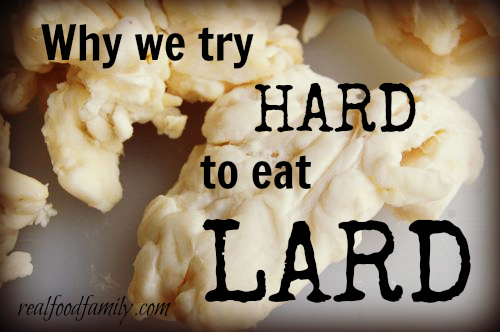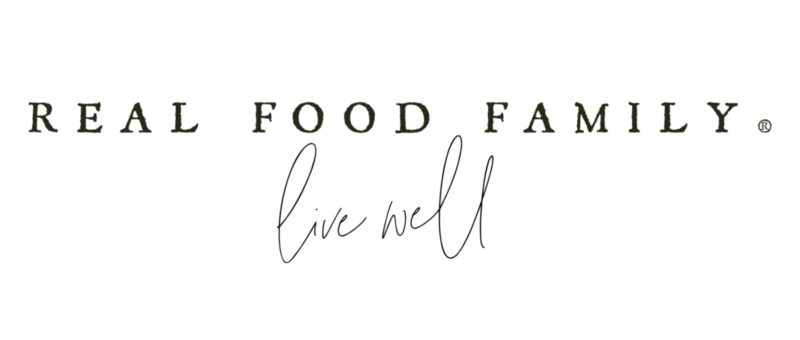
You may find it surprising that our family actually tries to eat lard as we endeavor to eat a more nutrient-dense diet.
I know what you’re thinking….WHAT?! What are your nutrition credentials again?
Most likely you believe that eating lard makes you fat…eating lard will turn you into a lard-butt, right?
First let’s look at the benefits of lard.
Lard:
- is a wonderful source of Vitamin D…1 tablespoon of lard has the same amount of Vitamin D that is found in 50 mushrooms- the best plant source of vitamin D. (Thanks DaNelle for that comparison!)
- is balanced in Omega 3 fatty acids (not high in Omega 6’s as almost all plant-based fats are)
- is high in oleic acid, which is that monounsaturated fat that the cardiologists tell us to get more of…found in olive oil and lard! Oleic acid also helps fight depression and has been shown to have anti-cancer properties.
- is high heat stability, so it is perfect for frying, sauteing and other high-heat cooking
- adds a fantastic texture and flavor to foods, including beans, tortillas and baked goods
Myths about eating LARD (and other fats)
Eating fat like lard will make you fat
Fat is essential for human health. Fat and carbohydrates work efficiently together to provide energy. Fat is necessary for a healthy metabolism. In fact, a diet with a significant amount of healthy fats is necessary for balancing hormones, blood sugar, liver function…all the body systems related to maintaining healthy weight. Often times people who avoid dietary fat suffer from depression, fatigue, anxiety, mood swings, hypoglycemia, insulin resistance, constant and insatiable hunger, gall bladder problems (gas, bloating, “acid-reflux,” loose stools), hormonal imbalances, menstruation problems, brittle hair and dry and wrinkly skin. They usually are eating a low-fat diet with the hopes of losing weight, yet are not having success with their efforts.
Lard is high in saturated fat and will clog your arteries.
According to a study published in The Lancet (1994 344:1195), the fatty acids found in artery clogs are mostly unsaturated, not saturated, as we have been led to believe. There is no evidence to show that saturated fat and animal foods like meat, eggs and milk cause coronary heart disease. It is actually the trans-fats (hydrogenated oils) and high-glycemic foods that are strongly correlated with coronary heart disease. (Click here to view the published journal on this point.)
So let’s be logical…
- We know that fat doesn’t make you fat, but sugar, hormone imbalances and toxins make you fat.
- We know that saturated fat in particular does not make you fat and does not clog your arteries.
- We know that fat helps balance hormones, which will help you lose weight.
- We know that fat balances blood sugar, which will help you lose weight.
- We know that healthy fats, those high in omega-3 fatty acids (animal fats), will support healthy hormones, cardiovascular health, mental health, and almost every other area of human health.
- We know that lard contains a high level of beneficial Vitamin D, Omega 3 fatty acids and oleic acid.
- We know that Americans and Westerners generally have a severe deficiency in vitamin D and omega-3 fatty acids and that we can all benefit from more of these nutrients.
- We know that we need to avoid cooking with delicate fats that oxidize during processing and heating and become extremely unhealthy and inflammatory. Instead we need to be cooking with high-heat tolerant fats (typically saturated fats).
- We know that butter and coconut oil (now considered healthy by most progressive nutrition professionals) are way more saturated than lard and that lard is only slightly less saturated than olive oil…so if you eat butter, coconut oil or olive oil, you should be happy eating lard, too (because it’s cheaper and nutritionally beneficial).
- We know that traditional cultures have been eating lard for centuries (throughout all of time), yet heart disease, diabetes and other degenerative diseases have only become a common problem since the introduction of vegetable oils and hydrogenated oils meant to replace “unhealthy” fats like lard and butter.
So why, when we can eat a fat that can make life delicious, healthy and awesome do we choose to eat rancid vegetable oils and take synthetic Vitamin D supplements because we won’t face the facts about traditional fats like LARD?
**Your source of lard is key because animals store toxins in fat tissue, so eating lard could mean eating something either extremely healthy or extremely toxic. Even the highest quality lard available is an inexpensive food, though. You can find lard from organic farmers and in some health food stores. Connect with your local Weston A. Price Foundation chapter to find sources. You can also look online for grass-fed/pasture-raised sources of animal foods.
For it’s versatility, nutrient-density, heat stability and long shelf life, LARD should be an essential ingredient in every Real Food home.
This post is featured at Thank Your Body’s Thursday Link Up.

